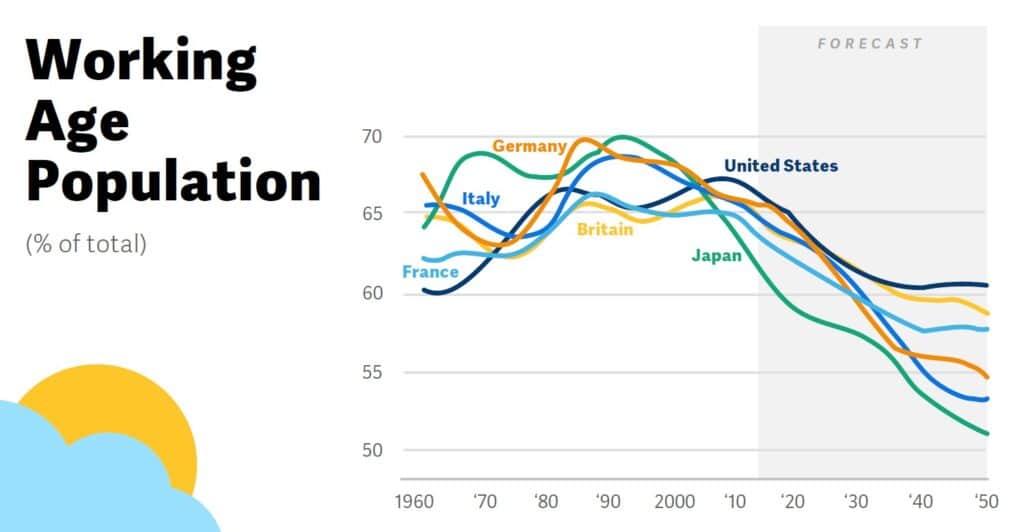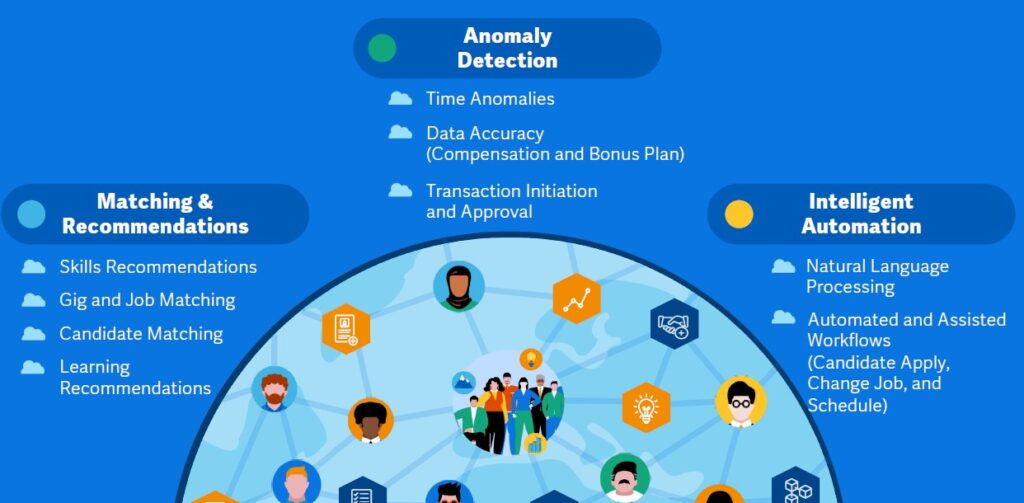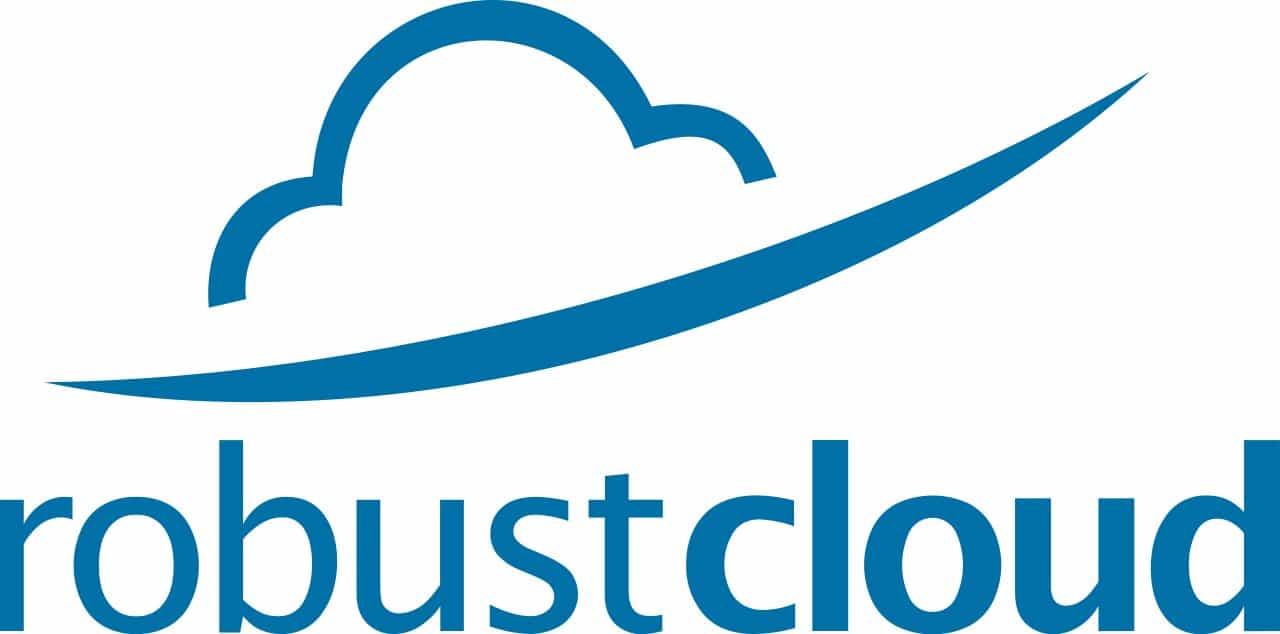Workday recently held its annual analyst conference in the Bay Area, where executives shared the company’s strategy to embed AI and ML technology throughout its portfolio of products and services. In this blog, we’ll explore the key takeaways from the conference and how Workday’s vision for the workplace can help employees thrive in an ever-evolving environment.

Background: The decreasing proportion of the working-age population is a significant trend in major world economies, as shown in Figure 1 above. This trend poses a significant challenge for organizations of all sizes, as they face a skills gap that must be bridged to meet business needs. Finding and retaining qualified workers to fill this gap is a critical challenge that organizations must address to maintain competitiveness through improved productivity. Technology can be a valuable tool for organizations to address challenges arising from population demographic changes through enhanced productivity. The following sections showcase the business processes within an organization that can gain advantages from utilizing Workday technology and highlights potential benefits to customers using Workday Extend.
Artificial Intelligence and Machine Learning at Workday: Enterprise adoption of AI and ML poses several pressing challenges, including ethical considerations and data quality. Failure to address these concerns can potentially result in biased and inaccurate outcomes. Workday has access to interactions of over 60 million workers from large organizations. With access to large volumes of domain-specific data, Workday can deliver accurate insights using AI and ML. Many organizations have opted-in for data sharing, allowing Workday access to anonymized data. Data quality enables Workday to mitigate the risk of bias and deliver better customer accuracy.
Financial Management: The CFO’s office is bogged down by various time-consuming business processes, such as expense management, audit and compliance, and accounts receivable and payable. Although Workday has already automated specific functions, such as supplier invoices and employee expense scanning, the actual value lies in its potential to aid employees in human-centric tasks, such as legal document analysis. Preventing a single contract clause that could potentially cause future losses can be a priceless asset to organizations that sign numerous supplier contracts annually. In the future, Workday can provide real-time insights into contract performance, which would help businesses make better decisions about when to renegotiate contracts.
Auditoria.AI, a company specializing in building automated intelligent apps for finance, has announced the addition of Generative AI to its technology stack for SmartBots trained in finance language. With Workday as an investor and partner, joint Workday and Auditoria.AI customers can benefit from this added capability to improve the productivity, accuracy, and precision of finance and accounting processes in the office of the CFO.
Human Capital Management: As organizations struggle with a talent shortage due to demographic changes (see figure 1 above), leveraging technology to enhance CHRO processes can provide an ideal solution for gaining efficiencies. VNDLY, acquired by Workday, provides a platform for managing contract workers – a popular and effective strategy many enterprises use to complement their full-time staff. Workday offered several examples of how AI and ML technologies have enhanced their HR processes, depicted in Figure 2.
Workday Extend: Enterprise software platforms require an easy-to-use and customizable environment to create custom applications that meet specific business needs. Workday Extend is a platform that shares a standard data model and security framework with the rest of the HR and Financial Management software. Workday partners build solutions to address unique business needs, including industry-specific requirements. Workday can further enhance the developer experience using the Extend platform by leveraging AI to recommend faster and more efficient approaches to building applications. For example, AI algorithms can identify appropriate pre-built modules based on solution requirements, significantly accelerating development. Additionally, Workday can utilize AI after implementation to analyze log data and identify areas where the application can be improved, ensuring that the solution continues to meet evolving business needs. By incorporating AI capabilities into Workday Extend, developers can streamline application development and deliver more intelligent and impactful HR and finance operations solutions.
Workday can improve and expedite the customer experience by integrating capabilities typically built in Workday Extend directly into its HR and Financial applications. This would enable users to initiate tasks and workflows directly from a chat window or automate actions based on data analysis from within the application. During the recent Workday summit, the company announced plans to incorporate conversational AI in future releases, significantly expanding the range of use cases that can be addressed. By leveraging Generative AI, Workday can empower customers to build unique and customized capabilities that augment transactional systems. This will enhance the efficiency of their HR and Financial management and enable customers to tailor their systems to meet specific business needs.
Summary: At its annual analyst conference, Workday explained the current use of AI and ML
technology and unveiled its strategy to embed the technology throughout its
range of products and services, leveraging its access to anonymized data from
over 60 million workers to mitigate the bias and deliver more accurate AI and
ML insights. Workday’s ability to reduce such risks can significantly benefit
businesses. Workday focuses on automating processes to aid human-centric tasks,
such as legal document analysis, and enhancing CHRO processes, including VNDLY
for managing contract workers. Workday Extend, a platform that shares a
standard data model and security framework with other software, can now
leverage AI to recommend faster approaches to building applications and analyze
log data for areas of improvement. The company plans to integrate
conversational AI in future releases, allowing users to automate actions based
on data analysis or initiate tasks from a chat window. Overall, Workday was
clear in its direction to leverage AI and ML in its portfolio, and execution
will be essential to customers seeing benefits from this technology.
